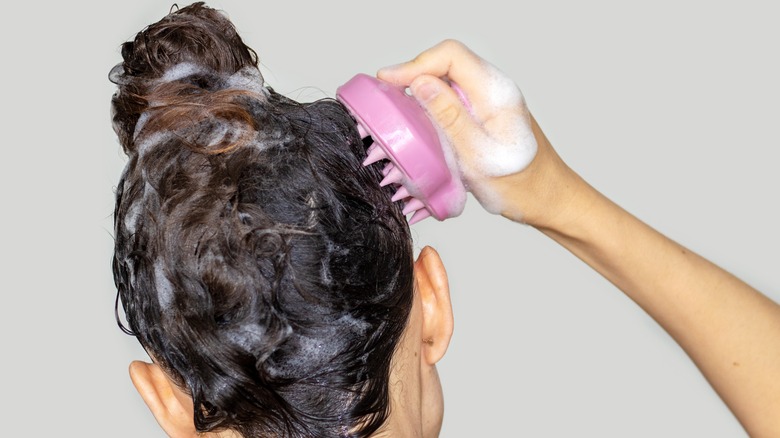Treating Seasonal Hair Loss Is Easier Than You Think - Here's How To Do It
You're not imagining it — your hair does fall out more during certain times of the year. Seasonal hair loss is a common phenomenon that is defined as excessive hair shedding during specific seasons of the year. Several season-related factors are believed to cause this hair loss. When the weather becomes warm, hair can lose moisture and become dry and brittle due to factors, such as sunlight exposure.
Similarly, in colder weather, the cuticle can contract and weaken, making it prone to breakage. Angela Lamb, a New-York based dermatologist, explained to TODAY that nutrient deficiencies and seasonal diet changes may also contribute to hair loss. Do you pass up your salads for hot cocoa during the winter? Reducing your intake of vital nutrients like vitamin A, biotin, and vitamin C can make your hair dry, brittle, and more likely to break.
Seasonal hair loss can be particularly frustrating, as it's almost impossible to keep your hair covered all the time. Luckily, treating seasonal hair loss is easier than you might think.
How you can treat seasonal hair loss
Certified trichologist William Gaunitz told RealSimple that a nutritious diet is one of the easiest ways to prevent seasonal hair loss. Some foods for better hair that you can focus on include eggs, fatty fish, and produce consisting of healthy fats, such as avocados.
If you're vegan or vegetarian, you can try tofu, protein-rich nuts, and oats. Another food-centered approach is to incorporate omega-3 fatty acids into your meals. This can increase scalp blood circulation, reducing inflammation that may be inhibiting hair growth. Some of the easiest ways to consume these fatty acids are through flaxseeds, walnuts, salmon, and mackerel.
Food aside, you can also treat seasonal hair loss with a gentle, moisturizing shampoo. Use conditioner after shampooing for extra protection in the colder months when the air is dry. Sleeping on a silk pillowcase or wearing a scarf to protect your hair can help, too, and don't rule out a scalp massage to improve circulation.
Factors that can aggravate seasonal hair loss
Seasonal hair loss may be unavoidable and natural, but there are ways you can reduce its severity. For starters, tight hairstyles like braids and ponytails are a no-go — they pull at your hair and strain it, which can accelerate the shedding rate. Another mistake to avoid is using hot styling tools, like blow dryers, curling irons, and straighteners. They can weaken your hair and make it more susceptible to seasonal loss.
If you aren't willing to part with your blow dryer, use it sparingly. It can also help to avoid excessive shampooing during this period. Instead, wash your hair as needed to prevent the stripping of natural oils. If you routinely experience seasonal hair loss, talk to your doctor to discuss ways you can ensure your body is getting all of the essential nutrients your hair needs.
As you follow these tips, remember not to fret — seasonal hair loss is temporary. If you become concerned about your hair loss at any point, don't hesitate to reach out to a medical professional for more information.


